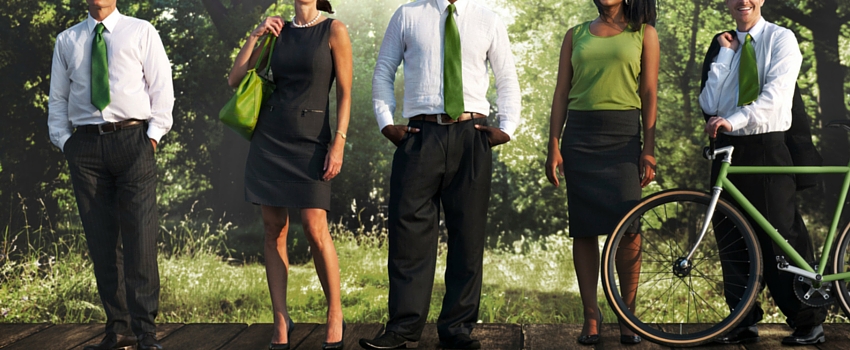Environmentalists want your business. Whether you’re talking about renewable energy, recycled products, electric cars, or the scientists who rely on government grants and private donations to study and reduce humanity’s impact on planet Earth, saving the planet is big business.
As I wrote in the previous iteration of this series – Environmentalists Want Your Money – Al Gore is a con artist who more than anyone else has championed the Global Warming scam as a means of transferring wealth and political power away from those he disfavors and into the hands and pockets of himself and those who share his vision.
Yet Gore is not alone. Waging an aggressive media campaign with the help of environmentalists, conservationists, scientists, politicians, celebrities, businessmen, and corporations, the Global Warming crowd is bent on unifying humanity to do battle with Climate Change – i.e., the weather.
The scary thing is that so far they’re doing a rather impressive job of it. And when I say that, I don’t mean they’re actually changing the weather, but rather that they are skillfully propagandizing humanity into believing we collectively can and will change Earth’s weather by giving the environmentalists all our money and power.
Interface, Inc. and The Business Logic of Sustainability
My wife and I and our six young children generate lots of dirty laundry in need of washing, drying, folding, and putting away. So when I spend an afternoon folding laundry in our bedroom, I like to make use of the good sized TV mounted on the wall in there. I especially like watching documentaries while I’m folding the laundry; it’s my kind of multi-tasking. I’m getting the chores done while at the same time investing in and educating myself.
The most recent laundry day I decided to listen to a series of TED Talks on Global Warming. After taking in two from Al Gore back-to-back, the next one to play was from Interface, Inc. Founder and CEO Ray Anderson. The Business Logic of Sustainability can be summed up neatly as Mr. Anderson’s conversion story. He once was blind to his sinful corporate ways, but then he saw the light and repented. Now that he’s confessed his former wickedness, he’s an ardent disciple of environmentalism and has converted his entire company to this new faith.
But aside from the evangelistic zeal with which Ray Anderson spoke of saving the planet, what struck me as odd was perhaps the simplest line from his speech when he said we need to redefine human civilization itself by aspiring to “More happiness with less stuff.”
Ironically, Anderson said this right after showing his audience a slide graph of 14 years of his flooring company’s profits in which he extolled the economic virtues of making more money by converting and marketing his business as “sustainable” – i.e., environmentalist friendly.
“More happiness with less stuff” is obviously supposed to be your mantra and not theirs, however, because they still define their own success in terms of making more money, selling more product, etc.
The takeaway? Sustainability is a marketing scheme designed to trick consumers into paying more money for goods which cost less to produce, thereby increasing the producers’ profits by manipulating you into a sense of shared purpose with them and the achievement of the greater good by buying their products.
Once you’ve spent more money on “sustainable” goods, you have less money to spend on other goods. That means you will buy and have less for the more you’re spending. Now this would bother you if the coordinated marketing efforts of people like Ray Anderson hadn’t persuaded you that you’re actually happier paying more money in exchange for less stuff. But they did persuade you, so it doesn’t bother you.
Is it just me, or does that seem incredibly manipulative? It’s a sort of “do as I say, and not as I do” when they measure their success by making more money by selling more of their product, but you as a consumer are supposed to measure your success by purchasing less product and having less of your money left over after you’ve purchased from them. Come again?
What makes a business sustainable?
As Ray Anderson explains with the example of Interface, Inc. – the flooring manufacturing company he founded in 1973 – sustainability is about finding ways to use less raw materials, or to recycle what we’ve thrown away instead of harvesting or mining fresh supplies from the Earth. Sustainable business is about maximizing efficiencies so as to minimize energy usage and raw material consumption. This can be done by finding alternative methods and materials, or through advances in technology.
“We reckon that we are a bit over halfway to our goal: zero impact, zero footprint. We’ve set 2020 as our target year for zero, for reaching the top, the summit of Mount Sustainability. We call this Mission Zero. And this is perhaps the most important facet: we have found Mission Zero to be incredibly good for business. A better business model, a better way to bigger profits. Here is the business case for sustainability.”
Now if you’re anything like me, you may be asking yourself: What’s the difference between a “sustainable” business pursuing better business and bigger profits from the standpoint of saving the planet, and what traditional businesses have done since the beginning of time for the purpose of remaining competitive and profitable?
As near as I can tell, the only difference is in how you spin it. The “sustainable business” model is just the traditional business model recycled.
Sustainability perceived is sustainability achieved.
You may have noticed that Capitalism is getting a bad rap these days. In the court of public opinion, CEOs and corporations are the Devil incarnate. What with their constant obsession with dollars and cents, buying and selling, it’s obvious all they care about is themselves. Sure, they innovate and provide the vital goods and services we enjoy and depend on every day, but they’re only doing it for themselves. They don’t really care about little people like you and me.
But you see, that’s where marketing comes in. Seemingly anything can be cast in a more flattering light, and the role of marketing is to apply the makeup and airbrush and Photoshop to the public image of corporations and – more importantly to the bottom-line – the products and services they’re relying on you to spend your money on.
So Ray Anderson can’t just have any flooring company. His Interface, Inc. needs to distinguish itself from its competitors somehow. The tactic he’s chosen is rather ingenious: persuading John Q. Public that he and his company care more deeply and sincerely than their competitors do about not only him, but everyone else he cares about. Anderson and Interface care about John Q’s parents and siblings and wife and children and grandchildren – absolutely everyone. And not only do they care about every man, woman, and child alive right now, they care about future generations yet unborn. And not only do they care about future generations yet unborn, they care about all the animals and plants and the very Earth itself. This flooring company is different because it doesn’t just care about itself, it cares about everyone and everything.
Once this fundamental distinction between Anderson’s company and its competitors is established in your mind, you’re supposed to see everything done by his company and others like it in a different light.
Don’t think of sustainable businesses cutting their electric and heating bills because they needed to pinch pennies to increase their profitability; think of those reduced energy bills as good for the environment.
Don’t think of their using recycled materials instead of buying newly harvested resources as them trimming waste and being more efficient; think of it as stemming the tide of Earth ravagers destroying the rainforests and Earth’s ozone layer.
And lastly but most importantly, don’t think of the sustainable business trying to persuade you to buy their product instead of their competitor’s as the timeless competition for sales engaged in ruthlessly by every successful business in the history of commerce; think of it as them trying to recruit you as partners in this venture to save our planet.
Don’t you see? We’re all in this together!
Ultimately, CEOs like Ray Anderson and companies like Interface, Inc. are trying to market shared purpose to their employees and customers, only it’s not quite the shared purpose they’re describing. Where they would say they need your help – your business – to help them save the planet, that’s not the essential thing. The real partnership they’re trying to establish is the timeless and traditional one of seller and buyer, producer and consumer. The real sustainability they’re after is the sort that comes with running a profitable business.
As Anderson says:
“Our products are the best they’ve ever been, inspired by design for sustainability, an unexpected wellspring of innovation. Our people are galvanized around this shared higher purpose. You cannot beat it for attracting the best people and bringing them together. And the goodwill of the marketplace is astonishing. No amount of advertising, no clever marketing campaign, at any price, could have produced or created this much goodwill. Costs, products, people, marketplaces — what else is there? It is a better business model.”
If their goal is genuinely as stated to have “zero impact, zero footprint” by the year 2020, Interface, Inc. can be expected to close its doors four years from now. Yet this is almost certainly not going to happen because companies exist to make money for their owners and employees, and ceasing to make money is not sustainable for the survival of those businessmen and those who depend on them for a paycheck.
In this way “sustainable” has a double-meaning, much like the concepts of shared purpose and partnership. Think about it. Companies marketing themselves and their products to consumers in a way that drives up the sale price and number of sales while simultaneously driving costs down is the perfect recipe for making their businesses sustainable.
“Sustainable business” is sustainable precisely because it makes a lot of money selling itself to you as good for the planet at a time in human history when massive and coordinated propaganda campaigns are convincing the whole world that we have a crisis on our hands, and the survival of every man, woman, and child of tomorrow hangs in the balance.
The Environmentalists Want Your Business
Suppose my wife sends me to pick up some meat for the supper she’s planning on cooking tonight – meatloaf, hamburgers, lasagna, or whatever. At the local Reynold’s Market or IGA here in Sidney, Montana I can buy my beef, pork, or chicken with a generic label based on what cut it is from the animal. We could buy the meat boneless or still on the bone and grind it ourselves. Or I can buy it already ground and choose 85% or 97% lean.
I’m concerned about additives and antibiotics and growth hormones in my family’s food, so I could go with ground bison or beef labeled USDA certified organic, grass-fed. The only problem is that ground bison and organic beef both cost a lot more. Now I’m standing there in my local grocery store and I’m faced with a dilemma. The more expensive meat has the premium label, and the rest don’t. I love my wife and children. I care about my own health. How can I in good conscience bring home meat that may be compromised or less than totally safe and healthy for us to eat?
Only now it isn’t just the meat. I have to decide whether to get regular or organic potato chips for a snack while we watch that movie after supper. I have to figure out whether we should only eat eggs from free-range chickens for breakfast tomorrow morning. Except, once again, the potato chips and eggs that sell themselves as healthier are also more expensive.
Next I get a text message from my wife Lauren asking me to pick up supplies for the guests we’re having over this weekend. Maybe I should forgo those disposable paper plates she’s asking me to get. Trees are cut down to make paper plates, and trees take CO2 out of the air. Fewer trees means more CO2 is left in the atmosphere. That CO2 is creating a greenhouse effect which, in turn, is making the planet warmer. That greenhouse effect is leading to steady melting of polar ice, which in turn is causing sea levels to rise and making orphans of baby polar bears.
Perhaps I’ll buy the paper plates after all. Only now that I’m thinking about CO2 in the atmosphere, I feel guilty for our gas-guzzling, CO2-emitting 12-passenger Ford E350 I drove to this grocery store. Sure, it’s all well and good that my six children and wife and I can get to church and soccer practice and the dentist. But how could I be so callous toward those baby polar bears?
Maybe Tesla Motors will wash the blood from my hands by announcing an inexpensive electric van big enough for my family.
Okay, so perhaps not all of that is going through my head every time I run to the grocery store for my wife, but I’m trying to explain how ridiculous buying even the most basic of things has become. There is literally no end to the number and variety of products about which I might be made to feel guilty these days for not buying the green alternative or buying the non-green option.
This is all a direct consequence of the environmentalist Global Warming hysteria, the con job propagated by demagogic huxters like former Vice President Al Gore. And make no mistake, the motivations for businessmen like Ray Anderson are remarkably similar to those of politicians like Al Gore when it comes to promoting this hogwash. These men want what you and I have and are willing to manipulate us through guilt and fear into giving it to them.
You’re either saving the planet or you’re destroying it.
As Black Panther leader Eldridge Cleaver once said, “You’re either part of the solution or you’re part of the problem.” The environmentalist movement has embraced this mindset with reckless abandon.
Implicit in the planet-saving rhetoric in marketing an electric car is that people like me who buy and drive a large, traditional, low-mileage 12-passenger van are on the opposite end of the ecological responsibility spectrum from owners of electric cars, and are therefore destroying the planet. We’re obviously not part of the solution, therefore we must be part of the problem.
This should be seen for what it is: a cruel, dishonest marketing ploy.
Where “keeping up with the Joneses” used to mean having the newest, nicest stuff and not being outdone by your neighbor down the street, today it means consumers, companies, and entire nations trying to outdo each other in proving themselves more devoted to saving the planet.
Make no mistake: the environmentalists want your business. The problem is obvious, however, in that these “Green,” “environmentally responsible” products are always significantly more expensive or less well-made than the traditional products they’re meant to replace. This means, in essence, a lower standard of living for people like you and me as we’re coerced more and more by corporate marketing and governmental regulation into buying only from “sustainable businesses.”
And yet, unfortunately, when the environmentalists want your business they don’t really care how your giving it to them effects your overall standard of living or general well-being. Their sense of moral obligation to the greater good is satisfied if they can tell themselves and us that they’re cheating us for the sake of Mother Earth. For them it is enough that they get what they want now and achieve greater profits at the expense of their competitors and us, the consumers. Meanwhile we’ll just have to content ourselves with the illusory sense of well-being derived from the mistaken impression that we’re somehow helping these frauds save the planet. Long after we’re dead, our great-great-grandchildren will supposedly thank us for this.
When seen in this light, we realize that men like Anderson and companies like Interface, Inc. really aren’t so altruistic as they’ve marketed themselves. In short, “sustainable business” is sustainable for the businessmen and their corporations, with little thought to how well you and I will sustain ourselves long-term.
Continue Reading:
The Global Warming Scam: Environmentalists Want Your Money
The Global Warming Scam: Environmentalists Want Your Government


